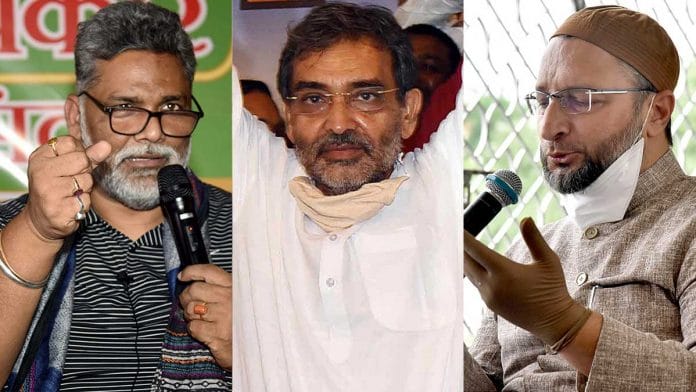Patna: A number of ‘third fronts’ have mushroomed in poll-bound Bihar, claiming to be an alternative to Nitish Kumar and Tejashwi Yadav. But leaders of the two main political rivals in the state, the National Democratic Alliance (NDA) and Grand Alliance, are not worried, and are busy fine-tuning their respective seat-sharing arrangements.
On Tuesday, former Grand Alliance partner and Rashtriya Lok Samta Party (RLSP) chief Upendra Kushwaha announced an alliance with Mayawati-led Bahujan Samaj Party (BSP). Together, they will contest all 243 seats in the state.
“We are offering an alternative to both NDA and Tejashwi Yadav,” Kushwaha told ThePrint, stressing that the latter was an unacceptable alternative to Nitish for the people.
Prior to his announcement, two other third fronts had already been formed.
On Monday, former MP and Jan Adhikar Party (JAP) chief Rajesh Ranjan alias Pappu Yadav announced the formation of Progressive Democratic Alliance with Bhim Army chief Chandrashekhar Azad’s Samaj Party and two other relatively unknown political outfits.
“People will reject the misrule of NDA and also the family rule of RJD (Rashtriya Janata Dal),” Ranjan told ThePrint.
Earlier, All India Majlis-e-Ittehad-ul-Muslimeen supremo Asaduddin Owaisi and former MP Devendra Prasad Yadav had announced the formation of United Democratic Secular Alliance (UDSA).
Also read: Owaisi’s AIMIM eats into ‘secular’ parties’ votes but not enough to help BJP win, data shows
What the dominant powers say
According to the JD(U), these fronts will aid Chief Minister Nitish Kumar in the assembly polls.
“The initial claim of the Grand Alliance to give a common platform to all anti-NDA forces has not happened. The development will definitely help the NDA as the anti-NDA voters are confused,” said former JD(U) MP Vijay Mishra.
Deputy Chief Minister Sushil Kumar Modi chose to highlight the performance of the alliance between JAP, Samajwadi Party and Nationalist Congress Party (NCP) in the 2015 assembly elections. “They failed to win a single seat. The votes obtained by their candidate varied from 2,000 to 3,000,” he said.
“No matter how many third fronts are created, their candidates will have the same impact as independent candidates. According to us, the BSP influence in Bihar is limited to eight assembly seats in Rohtas and Buxar districts,” he added, referring to the latest alliance.
Even the RJD leaders agreed with the deputy CM. “Most of the parties have no political base in Bihar. Our fight is against BJP. Others hardly matter,” said RJD’s national vice president Shivanand Tiwari.
However, some RJD leaders pointed out that the third front candidates are like double-edged swords. “If they put up a Yadav candidate, it will hit our base. If they put an upper caste candidate they will erode the NDA vote. However, the number of votes will not be enough to influence the results,” said an RJD MLA, who didn’t wish to be named.
“There may be a marginal rise in independent MLAs like from the present 6 to 10. Still, I do not think they will influence government formation,” he added.
Also read: Nitish showers sops on women as he woos his key vote bank ahead of Bihar polls
‘Getting rid of unwanted elements’
Nearly all the new fronts have been created by leaders who failed to negotiate their demands either with the Grand Alliance or the NDA.
RLSP chief Upendra Kushwaha was demanding 30 seats from the RJD in the Grand Alliance. He was offered five, according to sources.
A senior BJP leader said Kushwaha had approached them for eight seats. “He was told that there was no space in the NDA,” said the leader, who didn’t wish to be identified.
Similarly, Rajesh Ranjan tried to get together with the Grand Alliance but was rebuffed by Tejashwi Yadav.
On Tuesday, Kushwaha alleged that there was a pact between the BJP and the RJD to finish off smaller parties in Bihar. BJP leaders agreed with Kushwaha, on the condition of anonymity.
“It’s better that Bihar gets rid of these elements who make disproportionate demands for seats ignoring their actual influence. In many cases they just sell off the ticket to the highest bidder. Both the BJP and the RJD have been arm-twisted in the past,” said a senior BJP leader, who did not wish to be named.
In 2015 elections, the BJP contested just 158 of the 243 seats, leaving the rest to its allies — Lok Janshakti Party, RLSP and Jitan Ram Manjhi’s Hindustani Awam Morcha (HAM). The BJP won 53 but its allies contesting 85 seats just won five.
Similarly, in the 2019 Lok Sabha polls, the RJD contested just 19 of the 40 seats. The RJD and all of its allies, except the Congress, drew a blank.
“The fact remains that Yadavs will not accept Pappu Yadav as an alternative to Tejashwi Yadav. Nor will Kushwahas accept Upendra Kushwaha as an alternative to Nitish Kumar who looks after their interests well,” said the BJP leader quoted above.
Apart from the BSP, Kushwaha has also tied up with an unknown political outfit called Janvadi Party (Socialist) led by one Sanjay Singh Chauhan.
New shops
There has also been a massive surge in the number of candidates who want to contest the polls.
“The number of candidates has increased because virtually every mukhiya or member of the Zila Parishad has become candidate in their respective constituencies. There are also candidates who have made money through illegal liquor trade and are willing to spend in elections,” said a JD(U) MLA, not wishing to be named.
“These third fronts will find no shortage of candidates. They are new shops for the election even though they might close down after polls,” added the MLA.
Bihar is set to vote in a three-phase election beginning 28 October, and the counting is on 10 November.
Also read: Shiv Sena is ready with another ‘sons of the soil’ ploy — this time for poll-bound Bihar






